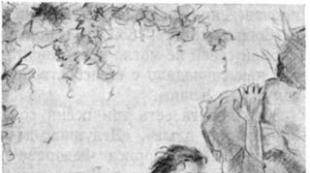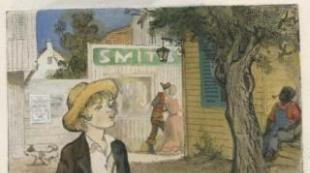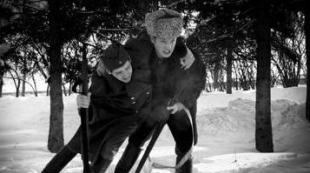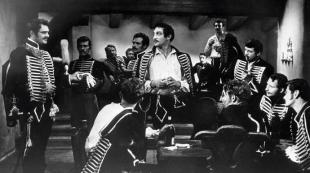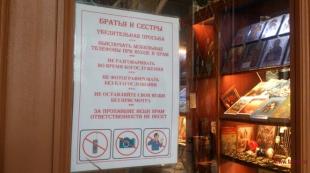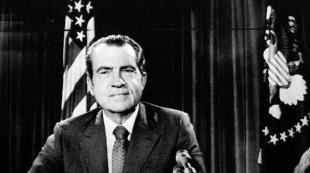Summary of prose shot
The narrator is an army officer who tells about the life of his regiment, which stopped in the town of ***. Every day, the regiment's officers visited Silvio's house. He was a military man, about thirty-five years old, “he seemed Russian, but had a foreign name.”
His main occupation was pistol shooting. One day about ten people from the regiment gathered at Silvio’s to play cards for money. Among the players there was a newcomer - officer r***, who began to argue with Silvio. Imperceptibly, the argument turned into a skirmish, at the end of which Silvio stood up, turning pale with anger, and asked the officer to leave. Some time passed, and no one remembered this incident.
One day Silvio received a letter and, after reading it, invited everyone to dinner on the occasion of his sudden departure. When everyone left, Silvio stayed with the narrator and told him about the incident with R***. Six years ago, Silvio served in a hussar regiment, was distinguished by a violent character and participated in all duels. A young man of “a rich and noble family” appeared in the regiment. Silvio immediately hated him and began to look for a reason for a quarrel. At a ball hosted by a Polish landowner, Silvio was rude to him. He slapped him, and that same night they went to fight. Silvio arrived earlier and was already expecting the enemy at the appointed place. Then he appeared, accompanied by a second. The lot fell to him to shoot first. He took aim and shot through Silvio's cap. Finally, it was Silvio’s turn, and now the young officer’s life was in his hands.
“What good is it for me to deprive him of his life when he doesn’t value it at all,” Silvio thought. He lowered the gun, saying that the last shot was his.
And now Silvio was going to go to Moscow to take revenge on him right at his wedding. “Let’s see,” said Silvio, “whether he will accept death so indifferently before his wedding.”
Several years passed, and the narrator met a rich count who lived next door to him in the same village. The narrator decided to visit him.
After examining the house, he noticed one of the paintings, which had been shot through by two bullets, and asked about the history of this painting. It turned out that the count was the young officer against whom Silvio was going to take revenge.
Once the count, entering the room, saw a man in the darkness and recognized him as Silvio.” “The shot is behind me,” said Silvio, “I came to unload my pistol.” Silvio decided to cast lots, and again the count was the first to shoot. He fired and hit the painting. Now Silvio took aim, but then he said: “I won’t shoot, I’m satisfied: I saw your confusion, your timidity; I made you shoot at me, I've had enough. You will remember me. I commend you to your conscience."
On his way out, Silvio stopped in the doorway, looked back and shot at the painting.
Searched here:
- Pushkin shot summary
- shot summary
- summary shot
Pushkin wrote “The Shot” (a brief summary of the story is given in this article) in 1830, and it was published a year later. Historians studying the writer’s biography argue that this work is clearly autobiographical in nature. There was a similar incident in the life of Alexander Sergeevich. So, a short summary of the story.
Description of the main character
The story begins with the story that the officer regiment was quartered in a certain place, let's call it N. The boredom here was terrible. The officers have nothing to do. After all, all the exercises took place only in the morning, and the rest of the time they were left to their own devices. In this place lived a former hussar who hosted dinners for young army men in his house. His name was Silvio. He was a strange and mysterious person. It was known that he had once served as a hussar, and then quit and settled in this outback. Nobody knew the reason why he had to do this. He himself was gloomy and silent, and did not enter into arguments or conversations. No one had any desire to get into his soul and ask him about the past. Pushkin begins his narrative in the work “The Shot” with an acquaintance with the main character. A summary of this episode is provided here.

Officers' card game clash
One day, when the officers were once again having lunch with Silvio, an unpleasant incident occurred between the owner of the house and one young servant. The guests, as always, played cards. This was their only entertainment. Silvio himself very rarely took part in such events. And if he did play, it was by his own rules. He never made any comments to his partners. And if he noticed their mistakes, he wrote down the opponents’ mistakes in a notebook, without saying a word. This time he was persuaded to play. During the process, Silvio noticed the punter's mistake and began to write something with chalk. His opponent noticed this and began to object. The former hussar was silent, continuing to do his job. And the young officer, losing his restraint, threw a copper shandal at the owner of the house. Everyone expected the matter to end in a duel. However, Silvio did not do this. Through gritted teeth, he asked the enemy to leave. The summary of Pushkin’s story “The Shot” does not allow us to convey the intensity of passions that was at that moment around the main character and his opponent.
Silvio talks about his old duel
One day, a former hussar received an envelope in the mail. After reading its contents, he urgently decides to leave. He reveals the reason for such a quick departure only to one young officer with whom he became close and to whom he could trust his secret. Silvio told him a story that happened to him many years ago, when he was still serving as a hussar. It turned out that then he challenged one daring officer to a duel for insulting him. The duel took place. The officer shot through Silvio's cap. When the time came to shoot the hussar, he refused to do so. After all, his offender stood, ate cherries and showed his disdain for him with all his appearance. After this incident, Silvio left the army and settled in this outback, where his officers found him. The letter he received contained information that his former opponent, who was now an earl, had recently married. Silvio decided to repay his debt by killing him in a duel. This is how Pushkin mysteriously describes the events of distant years in the life of the main character in the story “The Shot”. A summary of the episode where Silvio shares his secret with a friend is given here.
Return shot of the hussar many years later

And so our hero appears in the house of the count, who did not expect to see his former colleague after so many years. Upon learning that Silvio wanted to fire a shot, the right of which remained with him, the count turned pale. After all, now he had something to lose. He got a young wife. This is how the story “Shot” ends (summary). Pushkin may have described in this work an incident that happened to him during a duel. Then the poet came to the duel with cherries - he had breakfast with them. That time everything ended well for him.
In 1830, Pushkin wrote the story “The Shot”. You have just read a summary of the work. The time of creation of the story in the life of Russia was marked by popular unrest and loss of political stability. It is possible that this is what prompted the author to write this work.
Year: 1830 Genre: story
Main characters: marksman Silvio, count and count's wife
Life in an army regiment goes on as usual. The boring life of the officers ends when they meet Silvio. This is an angry and wayward person, but interesting in his own way. Its history is surrounded by numerous legends. It is not clear on what means he lives, but he systematically sets tables for the officers. Among other things, he is an excellent shooter.
One day, while playing cards, Silvio quarreled with a young officer who did not like his sullenness.
One day Silvio gathered the officers for a farewell dinner, after which he had to leave. After dinner, Silvio revealed his secret to one of the officers. It turned out that for many years he had been yearning to fire back at a man with whom he had once had a duel, and finally such an opportunity presented itself, since his offender was in close proximity.
Many years later, the narrator stops at a certain count’s and sees a bullet-ridden painting in the living room. The count said that this shot was fired by Silvio, who found him, the count, and finally demanded satisfaction. Silvio did not play by the rules in this unfinished duel, firing a premature shot. The count's frightened wife ran into the room, but she was assured that the “friends” were just joking. Silvio was satisfied only by the fact that he saw genuine fear on the count’s face.
They said about Silvio that he died in Greece during the uprising.
Read the summary of Pushkin Belkin's Tale Shot
Every person in life wants to bring all things to an end, so that they can then live calmly, with the thought that everything has been completed.
Silvio is not as simple a person as he might seem at first glance. This person is a man, approximately thirty-five years old in appearance. He once served in the hussars in his youth, which made him very smart. But then he decided to resign for his own reasons. After his resignation, as if withdrawing into himself, he soon settled in a small village, it can even be called a shtetl, but it is very small and poor. Once upon a time, for this young man, his whole life seemed to be reunited in the image of a pistol, or, more precisely, of shooting from it. This hussar was not averse to shooting in duels and simply in life. And not only did he not mind shooting, he was an excellent shot with a pistol, since this was not only an important matter for the military, but also his hobby, his eternal passion, which, it seemed, had only now faded with time. And yet, even now, when he lives in this inaudible place, he still cherishes the dream of finishing the unfinished duel with the count, which they never reached the end of. This count is also not a simple person, since, moreover, his appearance speaks for itself. He is handsome, stately, and also a little younger than Silvio. Since the young man is thirty-two years old. This count is the hussar’s opponent in the duel that was never completed by them.
Now Silvio lives indifferently in a small village, doing almost nothing special. One day a young man came to the village, who over time was fully privy to this story, almost unwillingly, he soon learned and after many years - the story of these two hot-tempered young people who once quarreled over a trifle. Since Silvio, as an older and simply wealthy friendly person, organized constant gatherings in his house for young officers and others, to put it mildly, the young man who came to the village was also able to get there over time.
In this society, it was as if the owner himself was immediately singled out for him, and not just because he was the owner, but because even without knowing that this person was the boss here, he could immediately single him out from the crowd. After all, Silvio was a tall and strong man, whose face was overgrown with a beard, he was gloomy and rather silent. He just never talked like that. Even when everyone was playing cards at the table, and one of the officers made a mistake, Silvio silently corrected the mistake made by someone inexperienced. This owner of the house was an authority for everyone, and not only because he invited everyone to his house, and because he was rich, but because some kind of unknown strength, hidden rebellion, and most importantly, was felt in him. everyone was lured, especially the young ones - by a mystery, and an eternal mystery that no one could solve, except for a young man who had recently arrived in the village.
It was to him that Silvio once told him that he was leaving to take revenge on his offender, who had once slapped him in the face in his youth. They wanted to fight a duel and even began to do so, but it was he, Silvio, who interrupted, and not at all out of cowardice, but simply because he was stopped by the impudence and, albeit shown, indifference of Count B. After all, the count ate cherries during their joint duel , indifferently waiting for his turn. Silvio could not stand it then and decided to cancel everything, saying that he did not want to interrupt the enemy’s breakfast. They were going to reschedule the duel, but everything turned out to be worse than expected.
Sometime many years later, the young man learns the continuation of the sad story from the count himself, who will move to live in a neighboring estate.
Picture or drawing Shot

Other retellings and reviews for the reader's diary
- Summary of Mann Tonio Kröger
The book is about a young writer who lost his love. The main character Tonio Kröger loved his classmate and friend Hans. The boy spent a lot of time with his friend. They were walking in the park
- Summary of The Green Mile by Stephen King
Paul is the head of the death row guard at the Green Mile prison. He is a good worker and not a bad person. Percy is the new guard on the same block. He recently entered this service and has already managed to harm others. Percy is cruel and cunning.
- Zhitkov
Boris Zhitkov was born into an intelligent family, a teacher and a pianist. This happened on August 30, 1882. They always had guests at home, scientists, musicians and poets. When Boris was 7 years old, the family moved to Odessa.
- Summary of the opera Free Shooter by Weber
The shooters' holiday has arrived. The villagers began to congratulate the winner of the competition, Kilian. A huntsman named Max was unable to hit the target even once and became a laughing stock. Out of anger, Max attacks Kilian with his fists
- Summary Little - No family
Mother Barberin lives in a small French village, raising her eight-year-old son Ramy. Her husband works in Paris as a mason, does not come home, only sends money. Ramy and his mother live amicably and happily, although not richly.
Belkin's Stories: Shot
Summary of the story
The army regiment is stationed in the town of ***. Life passes according to the routine established in the army, and the garrison boredom is dispelled only by the officers’ acquaintance with a certain man named Silvio, who lives in this place. He is older than most of the regiment's officers, gloomy, has a tough temper and an evil tongue. There is some secret in his life that Silvio does not reveal to anyone. It is known that Silvio once served in a hussar regiment, but no one knows the reason for his resignation, as well as the reason
Living in this outback. Neither his income nor his fortune are known, but he keeps an open table for the officers of the regiment, and at dinners champagne flows like a river. For this, everyone is ready to forgive him. The mystery of Silvio's figure sets off his almost supernatural skill in shooting with a pistol. He does not take part in the officers’ conversations about fights, and when asked if he has ever fought, he answers dryly that he has. Among themselves, the officers believe that some unfortunate victim of his inhuman art lies on Silvio’s conscience. One day, several officers gathered at Silvio’s as usual. Having drunk a fair amount, they started a card game and asked Silvio to sweep the bank. During the game, as usual, he was silent and wordlessly corrected the punters’ mistakes in the notes. One young officer, who had recently joined the regiment and did not know Silvio’s habits, thought that he had made a mistake. Enraged by Silvio's silent stubbornness, the officer threw a shandal at his head. Silvio, pale with anger, asked the officer to leave. Everyone considered the fight inevitable and had no doubt about its outcome, but Silvio did not call the officer, and this circumstance ruined his reputation in the eyes of the officers, but gradually everything returned to normal and the incident was forgotten. Only one officer, with whom Silvio sympathized more than the others, could not come to terms with the idea that Silvio had not washed away the insult.
One day, at the regimental office, where mail arrived, Silvio received a package, the contents of which greatly excited him. He announced his unexpected departure to the assembled officers and invited everyone to a farewell dinner. Late in the evening, when everyone was leaving Silvio's house, the owner asked the officer he liked most to stay and revealed his secret to him.
Several years ago Silvio received a slap in the face, and his offender is still alive. This happened during the years of his service, when Silvio had a violent temper. He was the leader in the regiment and enjoyed this position until “a young man of a rich and noble family” joined the regiment. He was the most brilliantly lucky man, who was always fabulously lucky in everything. At first he tried to achieve Silvio’s friendship and affection, but, not succeeding in this, he moved away from him without regret. Silvio's championship wavered, and he began to hate this favorite of fortune. Once, at a ball held by a Polish landowner, they quarreled, and Silvio received a slap in the face from his enemy. At dawn there was a duel, to which the offender Silvio came with a cap full of ripe cherries. By lot, he got the first shot, having fired it and shot through Silvio’s cap, he stood calmly at the point of his pistol and happily feasted on the cherries, spitting out the seeds, which sometimes flew to his opponent. His indifference and equanimity infuriated Silvio, and he refused to shoot. His opponent indifferently said that Silvio would have the right to use his shot whenever he pleased. Soon Silvio retired and retired to this place, but not a day passed that he did not dream of revenge. And finally his time has come. They inform him “that a famous person will soon enter into a legal marriage with a young and beautiful girl.” And Silvio decided to see “whether he will accept death as indifferently before his wedding as he once waited for it behind the cherries!” The friends said goodbye and Silvio left.
A few years later, circumstances forced the officer to resign and settle in his poor village, where he died of boredom until Count B*** came to a neighboring estate with his young wife. The narrator goes to visit them. The Count and Countess charmed him with their social manners. On the living room wall, the narrator’s attention is drawn to a painting shot through by “two bullets embedded in one another.” He praised the successful shot and said that he knew in his life a man whose shooting skill was truly amazing. When asked by the Count what the shooter's name was, the narrator named Silvio. At this name, the Count and Countess were embarrassed. The Count asks if Silvio told his friend about a strange story, and the narrator guesses that the Count is the same old offender of his friend. It turns out that this story had a continuation, and the shot-through picture is a kind of monument to their last meeting.
It happened five years ago in this very house, where the Count and Countess spent their honeymoon. One day the count was informed that a certain person was waiting for him, who did not want to give his name. Entering the living room, the count found Silvio there, whom he did not immediately recognize and who reminded him of the shot left behind him and said that he had come to unload his pistol. The countess could come in any minute. The Count was nervous and in a hurry, Silvio hesitated and finally forced the Count to draw lots again. And again the count got the first shot. Against all the rules, he fired and shot through the picture hanging on the wall. At that moment the frightened countess ran in. The husband began to assure her that they were just joking with an old friend. But what was happening did not look too much like a joke. The countess was on the verge of fainting, and the enraged count shouted at Silvio to shoot quickly, but Silvio replied that he would not do this, that he saw the main thing - the count’s fear and confusion, and he had had enough. The rest is a matter of conscience for the count himself. He turned and walked towards the exit, but stopped right at the door and, almost without aiming, fired and hit exactly the place in the painting shot through by the count. The narrator did not meet Silvio again, but heard that he died while participating in the Greek uprising led by Alexander Ypsilanti.
You are currently reading: Summary of Belkin's Tale: Shot - Pushkin Alexander Sergeevich
